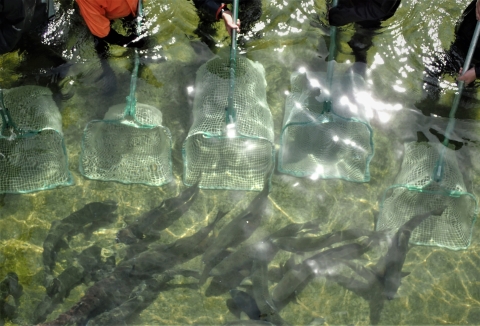About Us
The Mid-Columbia Fish & Wildlife Conservation Office (MCFWCO) provides technical fisheries assistance and cooperates with other Service programs, agencies, tribes, and entities using and managing aquatic species and their habitats in the mid- and upper-Columbia River Basin.
Our Mission
The MCFWCO focuses on:
- Assisting in the collection, evaluation, coordination, and dissemination of fisheries information to help restore declining fish species, recover species listed under the Endangered Species Act, preclude the need for future listings of new species, and provide science-based management of aquatic resources.
- Providing long-term monitoring, evaluation, and technical support to assess the status of fish populations. Learn more about our monitoring and evaluation program via video on the Friends of Northwest Hatcheries YouTube channel.
- Determining the survival, contribution, and impacts of hatchery fish on wild populations. MCFWCO evaluates three U.S. Fish and Wildlife Service mitigation hatcheries located at Winthrop, Entiat, and Leavenworth, Washington that release spring Chinook salmon (Oncorhynchus tshawytscha), steelhead (O. mykiss), and coho salmon (O. kisutch).
- Providing technical assistance to agencies that have authority to set fish management regulations and to many land owners (e.g., federal, state, tribal, and private) to prevent the loss of, damage to, and best management practices for the long-term benefit of fish and their habitats.
- Promoting interagency coordination by serving on technical and policy level workgroups (committees, councils, commissions, etc.) in the areas of hydro systems, harvest, hatchery, and habitat management.
Our History
What is now the Mid-Columbia Fish & Wildlife Conservation Office was established in 1974 under the authority of the Mitchell Act and the Anadromous Fish Conservation Act as the Fishery Assistance Office, Coulee Dam. The office provided technical fisheries assistance to the 1.3 million acre Colville Indian Reservation and to the Spokane Tribe. In 1976, the Colville Tribe hired their own fisheries biologists.
In 1978, the Service office was moved to the Leavenworth National Fish Hatchery in Leavenworth, Washington, and was renamed the Fishery Assistance Office, Leavenworth National Fish Hatchery. The office assumed responsibility for evaluating hatchery fish production at the three hatcheries in the Leavenworth National Fish Hatchery Complex (Leavenworth, Entiat, and Winthrop National Fish Hatcheries). In addition, the office conducted field studies and prepared several reports summarizing production and status of several salmon species in the mid-Columbia River area and factors affecting their abundance.
In 1990, the station was renamed the Mid-Columbia River Fishery Resource Office (MCRFRO) to better reflect the expansion of the fisheries program in eastern Washington. In 1998, a suboffice was established in Yakima, Washington, to coordinate activities related to flow issues and tribal trust responsibilities in the Yakima River Basin. In 2001, the office moved to larger facilities on the southeast grounds of the hatchery.
In 2010 the Mid-Columbia River Fishery Resource Office was realigned to be part of the Leavenworth Fisheries Complex. The Complex also includes the Leavenworth, Entiat, and Winthrop National Fish Hatcheries.
In 2016, the MCRFRO was re-named the Mid-Columbia Fish & Wildlife Conservation Office (MCFWCO). The scope of work of MCFWCO continues to evolve in response to declines in populations of native fish species, changes in roles and responsibilities, and changes in funding.
Other Facilities in this Complex
Entiat, Leavenworth, and Winthrop National Fish Hatcheries are mitigation hatcheries established by the Grand Coulee Fish Maintenance Project (1937) to compensate for anadromous fish losses above Grand Coulee Dam. All three produce spring or summer Chinook salmon, and Winthrop NFH produces steelhead.
As part of the Leavenworth Fisheries Complex, the Mid-Columbia Fish and Wildlife Conservation Office evaluates the hatchery production programs, provides technical assistance, and assists the coordination of operations and production. The MCFWCO cooperates with other Service programs, agencies, tribes, and entities using and managing aquatic species and their habitats in the mid- and upper-Columbia River Basin.




